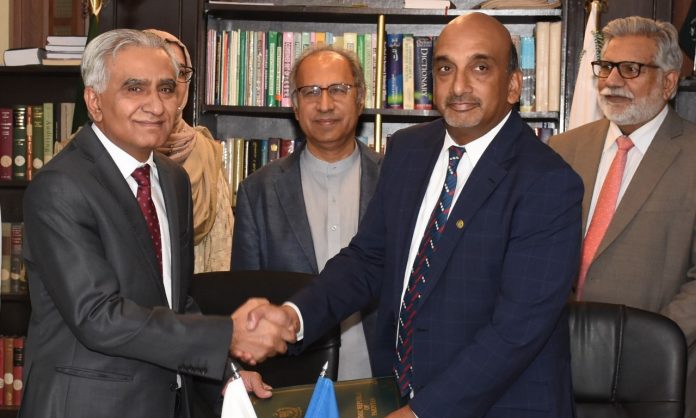ISLAMABAD: Pakistan and World Bank (WB) on Tuesday signed three loan agreements worth $918 million to help support revenue mobilisation and higher education development in the country.
The agreements were signed by Economic Affairs Division Secretary Noor Ahmed and WB Country Director for Pakistan Patchamuthu Illangovan. The representatives of the Higher Education Commission (HEC) and the Government of Khyber Pakhtunkhwa signed their respective project agreements.
Adviser to the Prime Minister on Finance, Revenue and Economic Affairs Dr Abdul Hafeez Shaikh witnessed the signing ceremony.
The World Bank would provide $400 million for a project titled ‘Pakistan Raises Revenue Programme’, which is aimed at contributing to a sustainable increase in domestic revenue by broadening the tax base and facilitating compliance.
The programme’s targeted results include increasing Pakistan’s tax to GDP ratio to 17pc; increasing the number of active taxpayers to 3.5 million; reducing the compliance burden of paying taxes and improving the efficiency of customs controls.
The programme of the Higher Education Development in Pakistan worth $400 million would support research excellence in strategic sectors, improve teaching and learning, and strengthen governance in the higher education sector.
The project would finance the nurturing of academic excellence in strategic sectors; support decentralised higher education institutes for improved teaching and learning; equip students and higher education institutions with modern technology; manage higher education information system and data drive services; and build capacity for proper monitoring and evaluation.
The third agreement was ‘Khyber Pakhtunkhwa Revenue Mobilisation and Resource Management Programme’ worth $118 million. The objective of the programme is to increase the collection of KP’s own-source revenues and improve the management of public resources.
This objective would be achieved through efficient revenue mobilisation; effective public resource management and capacity building to enhance e-government functionality.
The programme would help the Khyber Pakhtunkhwa government to mobilize its own source revenue in order to address the constraint of limited fiscal space for investment and public service provision and efficient and strategic use of the province’s financial resources.
Later, the WB country director held a meeting with the prime minister’s adviser on finance.
The adviser thanked the WB team for extending continuous support to Pakistan in its efforts to achieve sustainable economic development in the country.
He appreciated the WB’s relationship with Pakistan and directed the programme implementing agencies to put their best efforts to implement the said programmes so as to achieve the desired objectives.




